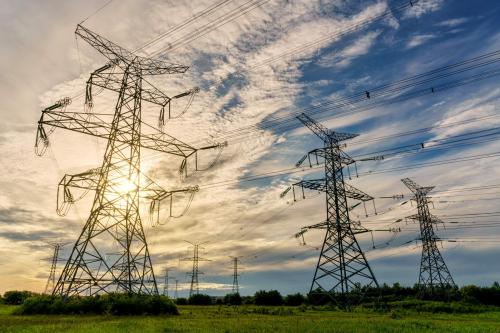

6:00 pm EDT - 8:00 pm EDT
Past Event
Content from the Brookings Doha Center is now archived. In September 2021, after 14 years of impactful partnership, Brookings and the Brookings Doha Center announced that they were ending their affiliation. The Brookings Doha Center is now the Middle East Council on Global Affairs, a separate public policy institution based in Qatar.
On May 10, 2009, the Brookings Doha Center hosted a discussion titled “Peace in the Pipeline? Prospects for Oil and Gas Cooperation in the Middle East and South Asia.” The panel was addressed by Adel Ahmed Albuainain, the General Manager of the Dolphin Energy Limited pipeline project in Qatar, Brookings Doha Center Visiting Fellow Saleem H. Ali who has been undertaking research on the topic and H.E. Mithat Rende, Ambassador of the Republic of Turkey to the State of Qatar. Hady Amr, Director of the Brookings Doha Center, moderated the discussion.
Ali presented the findings of the research he has been conducting on the role that oil and gas pipelines may play in fostering cooperation between adversaries, particularly in the Middle East and North Africa. Ambassador Rende elaborated on the pipeline projects between Turkey and its neighbors as an example of the regional cooperation, while Albuainain discussed the economic and political partnership between Gulf Cooperation Council member states that has developed with the Qatar-UAE-Oman pipeline project.
Ali gave an overview of the research he had accomplished while based at the Brookings Doha Center on both existing pipeline projects and possible future projects. He cited several examples of past pipelines in the region that were built and used even if there were conflicts between the project partners. Examples he discussed included the Kirkuk-Haifa pipeline, the Algeria-Morocco-Spain pipeline, the Libya-Italy pipeline, and the Turkmenistan-Iran-Turkey pipeline. He stressed that even though there were not always amiable relationships between these countries, the pipelines provided a reason for cooperation and for resolving some of the arguments. Libya and Italy, for instance, have had a somewhat tense history, and yet they were able to use the pipeline to improve their ties. Given past successes, Ali said that future projects are promising and should be encouraged. He focused particularly on the possibility of a Turkmenistan-Pakistan-India pipeline, which could bring new cooperation between Central Asia and South Asia and an Iran-Pakistan-India pipeline that could be instrumental in improving ties between these countries. Dr. Ali also suggested that President Obama reconsider U.S. support for the Iran-Pakistan-India pipeline because it could have the potential to mend relationships both between the participating countries and between the United States and Iran. He ended by stating that “the great game” theory, which suggests that oil and gas have always merely been means for countries to manipulate their interests in the region was passé, and that there is real potential for cooperation to emerge out of these pipeline projects.
Rende concurred with Ali’s findings that these pipelines can indeed contribute to political stability and security in the region, using his own country, Turkey, as an example. He opened by stating that energy issues are political issues and will only be further politicized as energy supply security becomes an increasingly urgent global matter. He stressed that consumer and producer countries should cooperate, especially with the current economic situation prompting a decline in the number of investors for new energy projects. Rende described how Turkey is a country for which pipelines have played an important role, ranging from the Kirkuk-Ceyhan pipeline to the new Baku-Tiblisi-Ceyhan pipeline. Turkey’s experiences with these energy projects have led him to believe that pipelines can indeed create mechanisms for mutual trust and contribute to stable relationships among the participating countries.
Albuainain, General Manager of the Dolphin Energy project, spoke about the Qatar-UAE-Oman gas pipeline, which he views as a clear example of regional cooperation, especially given the challenges faced. The Dolphin project has fostered agreements between countries in the Gulf and also been beneficial to the region in terms of increased employment and a transfer of expertise and experience. Alubainain also discussed the project’s commitment to environmental conservation, another favorable outcome of this collaborative gas pipeline project.
Following the remarks of the two speakers was a lively and comprehensive question and answer session that covered a variety of topics ranging from the benefits of oil and gas pipelines compared with those of shipping, maintenance of pipelines, and the new global players in the oil and gas market. One question was raised regarding whether cooperation was actually result of pipelines or if the cooperation had to come first out of necessity. Ali acknowledged that in these situations it can be difficult to determine direct or linear causality, but pipelines can play an important role in fostering ongoing international cooperation.


Robin Brooks
April 11, 2024

March 6, 2024

Jonathan Wilkinson
March 6, 2024